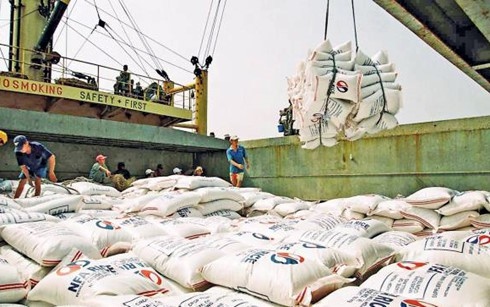Rice exports to EU anticipated to make breakthroughs through EVFTA
VOV.VN - The impending European Union-Vietnam Free Trade Agreement (EVFTA) is projected to act as a boost for export turnover and enhance the competitiveness of Vietnamese rice in the EU market, according to a business executive.
Despite the recent outbreak of the novel coronavirus pandemic having a significant impact on exports in general, the rice industry in particular, the demand for rice consumption in European countries is predicted to increase since it is considered as an essential food item, said Pham Thai Binh, General Director of Trung An High-tech Agriculture Joint Stock Company.
Indeed, he attributed the recent increasing demand in the company’s rice orders from countries such as Australia, Germany, and France, to the large number of overseas Vietnamese currently living in these nations.
Binh noted that Vietnamese rice exports to the EU market are subject to high taxes of up to 45%, with some EU countries even moving to impose import duties of up to 100%. It is therefore anticipated that when the EVFTA comes into force it will serve to help Vietnamese rice products enjoy a greater competitive advantage in comparison to the Cambodian rice, an item that is currently exempt from import tax in the EU market.
If the EVFTA is subsequently ratified by the Vietnamese National Assembly as expected, the trade deal is poised to come into effect in August, with the tax rate imposed on rice set to be immediately slashed to 0%. This dramatic tax cut is predicted to greatly bolster rice exports to the EU market in the near future, Binh added.
According to the executive, the EU is a highly demanding market when it comes to food hygiene and safety. Therefore, items that contain residue of pesticides or banned substances will find it very difficult to enter this market.
To make inroads into the market, Binh said local firms must obtain GlobalG.A.P certificates and swiftly move to adapt their organic farming methods in order to develop production chains that come up to international standards.
Trung An company is currently exporting its products to the EU and has subsequently met the stringent requirements set by EU importers. The firm can now immediately accelerate its exports to the European market once the trade pact comes into force.
To seize upon the benefits brought about by the EVFTA, Binh suggested that the Ministry of Industry and Trade (MoIT) organise training courses for businesses to gain a better understanding of the details of the trade pact.
Similarly, the Ministry of Agriculture and Rural Development should organise training courses to help farmers gain insights into new farming methods which will serve to meet standards set by EU importers and ultimately allow Vietnamese rice to gain entry into the EU market.
According to the Vietnam Food Association, despite the rice export quota to the EU standing at only 80,000 tonnes, Vietnamese rice exported to this market is generally of high quality. Therefore, the status of local rice will be elevated within the international market upon gaining entry into the EU.

